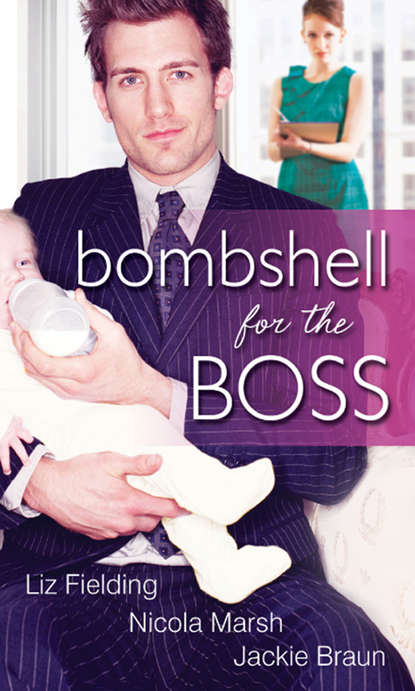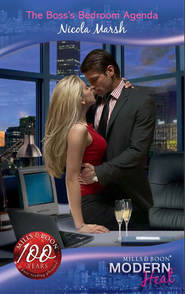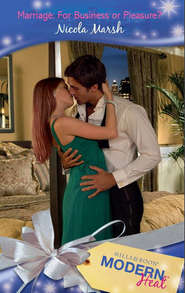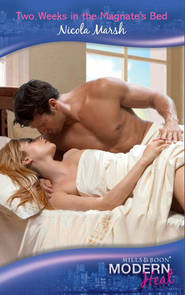По всем вопросам обращайтесь на: info@litportal.ru
(©) 2003-2024.
✖
Bombshell For The Boss: The Bride's Baby
Автор
Год написания книги
2019
Настройки чтения
Размер шрифта
Высота строк
Поля
She glanced at her watch, deciding to give it a couple of minutes, crossing without thinking to the shelves, running her hand over the spines of worn, familiar volumes. Everything was exactly as she’d left it. Even the family bible was on its stand and she opened it to the pages that recorded their family history. Each birth, marriage, death.
The blank space beneath her own name for her marriage, her children—that would always remain empty.
The last entry, her mother’s death, written in her own hand. After all her mother had been through, that had been so cruel. So unfair. But when had life ever been fair? she thought, looking at the framed photograph standing by itself on a small shelf above the bible.
It was nothing special. Just a group of young men in tennis flannels, lounging on the lawn in front of a tea table on some long ago summer afternoon.
She wasn’t sure how long she’d been standing there, hearing the distant echo of her great-grandfather’s voice as he’d repeated their names, a roll-call of heroes, when some shift in the air, a prickle at the base of her neck, warned her that she was no longer alone.
Not Pam. Pam would have spoken as soon as she’d seen her.
‘Checking up on me, Mr McFarlane?’ she asked, not looking round, even when he joined her. ‘Making sure I’m not getting too comfortable?’
‘Who are these people?’ he asked, his voice grating as, ignoring the question, he picked up the photograph and made a gesture with it which—small though it was—managed to include the portraits that lined the stairs, the upper gallery, that hung over fireplaces.
She waited, anticipating some further sarcasm, but when she didn’t answer he looked up and for a moment she saw genuine curiosity.
‘Just family,’ she said simply.
‘Family?’ He looked as if he would say something more and she held her breath.
‘Yes?’ she prompted, but his eyes snapped back to the photograph.
‘Didn’t they have anything better to do than play games?’ he demanded. ‘Laze about at tea parties?’
Her turn to frown. Something about the photograph disturbed him, she could see, but she couldn’t let him get away with that dismissive remark.
Laying a finger on the figure of a young man who was smiling, obviously saying something to whoever was taking the photograph, she said, ‘This is my great-uncle Henry. He was twenty-one when this was taken. Just down from Oxford.’ She moved to the next figure. ‘This is my great-uncle George. He was nineteen. Great-uncle Arthur was fifteen.’ She leaned closer so that her shoulder touched his arm, but she ignored the frisson of danger, too absorbed in the photograph to heed the warning. ‘That’s Bertie. And David. They were cousins. The same age as Arthur. And this is Max. He’d just got engaged to my great-aunt Mary. She was the one holding the camera.’
‘And the boy in the front? The joker pulling the face?’
‘That’s my great-grandfather, James Duchamp. He wasn’t quite twelve when this was taken. He was just short of his seventeenth birthday four years later when the carnage that they call The Great War ended. The only one of them to survive, marry, raise a family.’
‘It was the same for every family,’ he said abruptly.
‘I know, Mr McFarlane. Rich and poor of all nations died together by the million in the trenches.’ She looked up. ‘There were precious few tennis parties for anyone after this was taken.’
Tom McFarlane stared at the picture, doing his best to ignore the warmth of her shoulder against his chest, the silky touch of a strand of hair that had escaped her scarf as it brushed against his cheek.
‘For most people there never were any tennis parties,’ he said as, incapable of moving, physically distancing himself from her, he did his best to put up mental barriers. Then, in the same breath, ‘Since we appear to be stuck under the same roof for the next week, it might be easier if you called me Tom. It’s not as if we’re exactly strangers.’ Tearing them down.
‘I believe that’s exactly what we are, Mr McFarlane,’ she replied, cool as the proverbial cucumber. ‘Strangers.’
He nodded, acknowledging the truth of that. The lie of it. ‘Nevertheless,’ he persisted and she glanced up, her look giving the lie to her words as she met his gaze, as if searching for something … ‘Just to save time,’ he added.
‘To save time?’
She didn’t quite shrug, didn’t quite smile—or only in self-mockery, as if she’d hoped for something more. What, for heaven’s sake? Hadn’t she got enough?
‘Very well,’ she said. ‘Tom it is. On the strict understanding that it’s just to save time. But you are going to have to call me Sylvie. My time may not be as valuable as yours, but it’s in equally short supply.’
‘I think I can manage that. Sylvie.’
Divorced from ‘Duchamp’ and ‘Smith’, the name slipped over his tongue like silk and he wanted to say it again.
Sylvie.
Instead, he cleared his throat and focused on the photograph.
‘Why is this here?’ he asked. ‘Didn’t you want it?’ Then, because if this had been a photograph of his family, he would never have let it go, ‘It’s part of your family history.’
Sylvie took the photograph from him. Laid her hand against the cold glass for a moment, her eyes closed, remembering.
‘When the creditors moved in,’ she said after a moment, ‘all I was allowed to take were my clothes and a few personal possessions. The pearls I was given by my grandfather for my eighteenth birthday. And my car, although they insisted on checking the log book to make sure it was in my name before they let me drive away.’
It should have mattered. But by then nothing had mattered …
‘You’ll understand if I save my sympathy for the people who were owed money.’
She looked up at him. So solid. So successful. So scornful.
‘You needn’t be concerned for the little men,’ she said. ‘We always paid our bills. Our problems were caused by two lots of death duties in three years and the fact that my grandfather, after a lifetime of a somewhat relaxed attitude to expenditure, had decided to think of the future, the family and, on the advice of someone he trusted, had become a Lloyds “name” a couple of years before everything went belly-up.’
A fact which, when he realised what it meant, had certainly contributed to the heart attack that had killed him and, indirectly, to the death of her mother.
‘The irony of the situation is that if he’d carried on throwing parties and letting the future take care of itself we’d all have been a lot better off,’ she added.
‘But this photograph doesn’t have any value,’ he protested. ‘Beyond historical interest. Sentimental attachment.’
‘Yes, well, they did say that once a complete inventory had been taken I would be allowed to come back, take away family things that had no intrinsic value. But then a world-famous rock star who’d visited the house as a boy was seized by a mission to conserve the place in aspic as a slice of history.’
Tom McFarlane made a sound that suggested he was less than impressed.
‘I know. More money than sense, but he made an offer that the creditors couldn’t refuse and, since he was prepared to pay a very large premium for his pleasure, he got it all. Family photographs, portraits, all the junk in the attic. Even Mr and Mrs Kennedy, the housekeeper and man of all work, were kept on as caretakers, so it wasn’t all bad news.’
‘Could they do that? Sell everything?’
‘Who was to stop them? I didn’t have any money to fight for the rights to my family history and, even if I did, the only people to benefit would have been the lawyers. This way everything was settled. Was preserved.’
And she’d been able to move on, make another life instead of every day being reminded of things she’d rather forget.
Jeremy putting off the wedding—just until things had settled down. Her mother’s determination to confront the people who were draining everything out of her family home. Her father … No, she refused to waste a single thought on him.
‘I’d moved into a flat share with two other girls by then and had barely enough room to hang my clothes, let alone the family portraits.’ She took the photograph from him and replaced it on the shelf where it had been all her life. All her mother’s life. All her grandfather’s life too. ‘Besides, you’re right. This isn’t just my history. As you said, it was the same for everyone.’
Had he really said that? he wondered as he looked around him.
Longbourne Court was a gracious minor stately home, but from the moment he’d walked through the door Tom had recognised it for what it was. A family home. A place where generations of the same family had lived, cradle to grave, each putting their mark on it.











